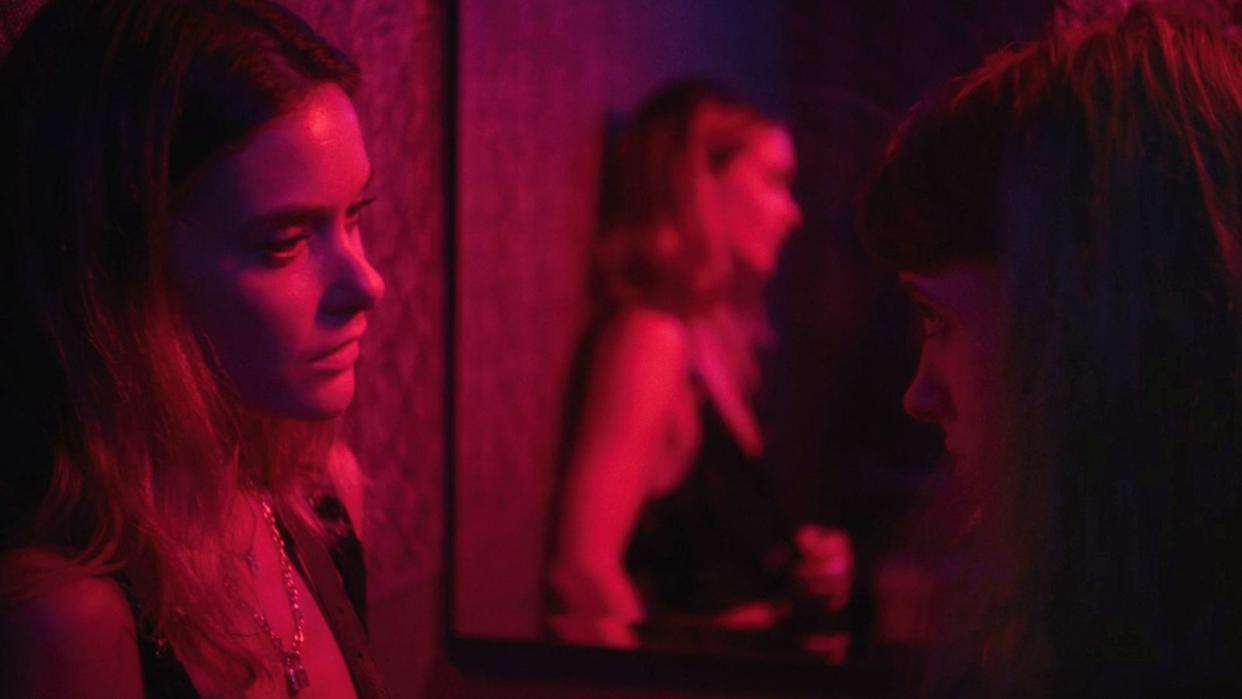‘Chestnut’ Review: ‘Stranger Things’ Star Natalia Dyer Impresses in a Frustrating Bisexual Love Triangle

It’s easy to see why a film like “Chestnut” might appeal to leading lady Natalia Dyer. This story of a young woman on the cusp of change isn’t too dissimilar from what’s happening in her own career right now. Just as Annie ponders the future, stuck in her uni town for the summer ahead of a new life in LA come fall, so too is Dyer contemplating a new world beyond “Stranger Things,” the Netflix behemoth that’s finally set to end later this year.
Judging by this indie and previous projects such as “Mountain Rest” and “Yes, God, Yes,” life after Hawkins will be far more grounded for the most part, yet in “Chestnut,” her character Annie still floats somewhat aimlessly. With little to do in the weeks leading up to her big move, Annie finds herself often drinking alone at a bar in the historic street of Philadelphia where the film derives its name. There, she strikes up a conversation with another woman named Tyler (Rachel Keller) who quickly becomes a source of fascination for Annie, and perhaps even a reason to stay.
More from IndieWire
That’s probably not a good idea though, especially as Tyler is also dating Danny (Danny Ramirez), a local guy who gets entangled with Annie too as the trio grow closer. The push-and-pull that ensues back and forth between the three of them is frustrating for everyone involved, but Annie especially who struggles to read Tyler’s true intentions, which are messy at best and even toxic at points. “Chestnut” feels painfully real in that regard and will ring true to anyone who’s held intense feelings for someone who likes the attention but refuses to commit back (read: pretty much everyone at some point in their lives), and for that, writer/director Jac Cron’s debut must be commended. After all, it’s not easy to accurately capture the ebbs and flows of attraction between three people without tipping into melodrama.
Yet “Chestnut” is also frustrating for audiences too. As Annie grows more confused by what she wants in life, drawn back and forth in a bisexual maelstrom of longing looks and stolen kisses, it’s not entirely clear what the film wants out of this love triangle either. There’s an element of finding yourself, of course, because that’s what you do when you’re coming of age in a summer set film on screen, but the script feels underdeveloped still — a work in progress like Annie, herself.
It’s refreshing to see bisexuality incorporated so casually at least. There’s no wrestling with emotions in this regard and Annie’s queerness is established without fanfare in a very organic way. Yet in comparison to a film like “Princess Cyd,” Stephen Cone’s sensitive exploration of bisexuality across the course of one summer, “Chestnut” lacks some much-needed nuance and purpose.
To be fair, part of that stems from Annie herself. The whole point is that she’s unsure of what she wants and more importantly, what’s right for her, but the result lacks drive. Although small steps are made and there is some visible growth for sure, Annie is passive and introverted to the point of dull on occasion. It’s honest at least, and Dyer’s natural charisma pulls us through with a gentle, likeable performance, but “Chestnut” often runs the risk of being restrained to the point where it becomes too subtle.
The rest of the cast do their best with the material too. Rachel Keller, a standout in both “Legion” and “Fargo,” brings some welcome yet muted chaos to the drama that unfolds while Marvel’s Danny Ramirez flexes his acting muscles instead of his superhero ones in a quiet, contemplative role as the male corner of this triangle. Even so, the stakes feel low when they really shouldn’t. It’s not like we’re asking for every bisexual threesome to channel the wicked mischief of “Passengers” or the throbbing eroticism of “Challengers.” But there at least needs to be a charge to it — some oomf to help set the film apart.
In that sense, “Chestnut” very much feels like a first feature. Everything is well made and beautifully shot with the requisite indie soundtrack, yearning close-ups, and atmospheric shots of Philly. There’s nothing to criticize in that sense, except you’re just left wanting more still. More personality, more emotion, and perhaps less use of bisexual lighting, which comes into play so much that it almost begins to feel forced if you’re already familiar with that gorgeous pink/purple/blue combo.
If this all sounds overly negative, it’s because “Chestnut” has so much unfulfilled potential. A seemingly simple phone call near the end between Annie and her grieving father hurts not because of what they say but because of what’s left unspoken, and there are other moments like this throughout which speak to other kinds of pain too, be it the realization someone’s ghosting you or that awkward ache when you realize what was once good has turned sour and there’s nothing you can do about it. Chella Man also deserves a shoutout for their charismatic work as Annie’s queer best friend in an underwritten role that could have been expanded into something more complex. But “Chestnut” falls short of giving them more of a voice, an issue that could also be used to describe the film as a whole.
Grade: C
Utopia will release “Chestnut” in select theaters on Friday, June 21. It will be available on all digital platforms on Tuesday, July 2.
Best of IndieWire
Sign up for Indiewire's Newsletter. For the latest news, follow us on Facebook, Twitter, and Instagram.
